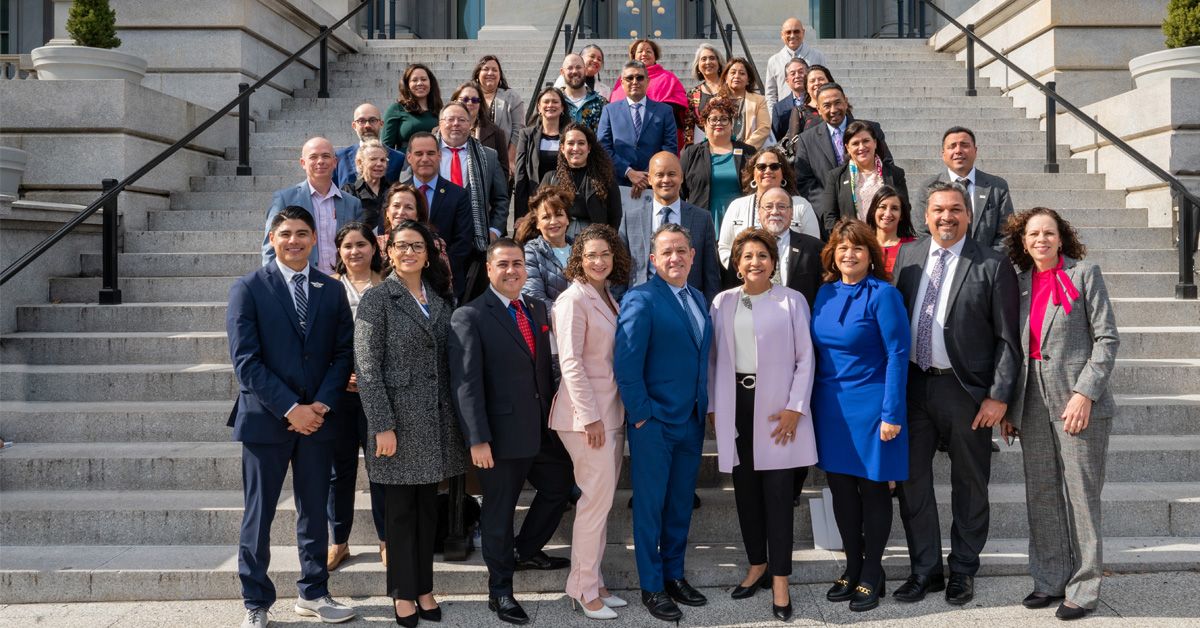UnidosUS and Affiliates Hear from the Biden Administration in White House Briefing
On February 15, 2023, Affiliate Leaders and UnidosUS staff and leadership attended the first briefing held by the White House Office of Public Engagement for UnidosUS Affiliate Network leadership in the Eisenhower Executive Office Building
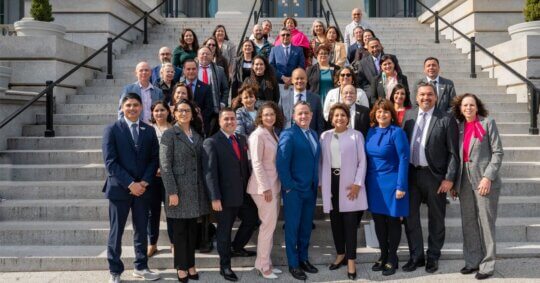
We heard from several representatives of the administration regarding a range of topics, including the economy, health, education, and Latino representation in government.
Keep up with the latest from UnidosUS
Sign up for the weekly UnidosUS Action Network newsletter delivered every Thursday.
ECONOMY
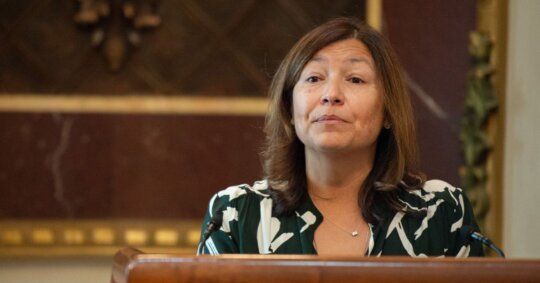
On the topic of the economy, we heard from Julie Rodriguez, Senior Advisor and Assistant to the President and Director for the Office of Intergovernmental Affairs, on President Biden’s overall economic approach. Rodriguez remarked that, in her view and the President’s, the evidence is now clear that trickle-down economics hasn’t worked, and she stated that President Biden believes in bottom up, middle out: opportunity for workers and small business, well-paying union jobs, and investing in building our economy.
Gene Sperling, White House American Rescue Plan Coordinator and Senior Advisor to the President, discussed the importance of factoring in equity when implementing economic policies and highlighted the hard work done by the administration to create simplified filing portals for the Child Tax Credit (CTC) and efforts to create new access to the CTC for 300,000 families in Puerto Rico.
Prior to the American Rescue Plan, the CTC was only available to roughly 10% of people on the island–those with 3 or more kids—and Puerto Rico had staggeringly high rates of child poverty, topping 60%, which is double the rate of child poverty in Mississippi. Now, 300,000 Puerto Rican families are benefiting from the increase in income. Sperling explained that a working partnership on implementation was needed for these gains and that it took more than just good intentions; it took listening and real effort to address the complex logistical issues involved.
He noted that the national effects of the CTC have also supported Latino children. In 2008, he explained, the poverty rate for Hispanic children was 1 in 3 (32%). But after the expansion of the CTC benefits and making the credit refundable (meaning that the lowest-income families could receive support), the poverty rate for Latino children was dramatically lowered to 1 in 12.
Speakers also discussed the impacts of record low levels of unemployment. Alex Jacquez, Special Assistant to the President for Economic Development and Industrial Strategy, National Economic Council, pointed out that previous recessions required 51 months (about 4 and a half years) for unemployment to recover but that following the pandemic, recovery occurred after just 23 months (under 2 years). He also highlighted that in 2021, we saw the highest rate of business formation by Latinos in more than a decade.
Related to Biden’s “bottom up, middle out” economic approach, Jacquez described how the Inflation Reduction Act will fund efforts to do climate mitigation, including solar panels and wind turbines, and that efforts by the administration and community organizations will be needed to ensure that these efforts generate good jobs, are done with dignity and fairness, and that they include the voices of, and benefits to, fence-line communities. He cited the administration’s commitment that 40% of the benefits of clean energy should flow to communities that have been historically excluded from such programs and efforts.
HEALTH
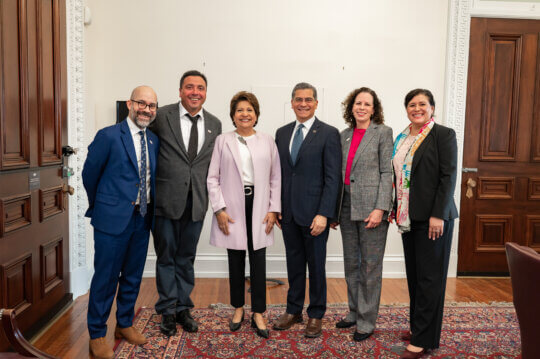
Regarding health and healthcare access, we heard from Secretary Xavier Becerra of the Department of Health and Human Services on Latino’s access to healthcare. During this administration, as he remarked, there was a 53% increase in Latino enrollment in the Affordable Care Act (ACA), and the efforts of the administration and its community partners were essential in closing gaps and disparities in vaccination rates. This effort relied on the use of trusted messengers to combat misinformation that was spreading within the Latino community, among other strategies. Dr. Ashish Jha, Coordinator of the White House COVID-19 Response Team, emphasized that the persistence of COVID shows there is an ongoing problem with misinformation that highlights a need for trusted voices that spread good information.
Secretary Becerra also discussed the urgency of efforts to keep millions of people covered by Medicaid following the end of the Public Health Emergency this spring. Called the Medicaid unwinding, efforts by states to confirm the eligibility of people for Medicaid coverage will be underway for the first time in years and will affect the coverage of 16 million people, many of whom are Latino, and who remain eligible for Medicaid but will be cut off due to administrative reasons. He pointed out that it is crucial for community-based organizations to raise as much awareness as possible about the upcoming Medicaid unwinding to ensure community members are not losing coverage without cause: “We need you desperately,” he implored.
EDUCATION
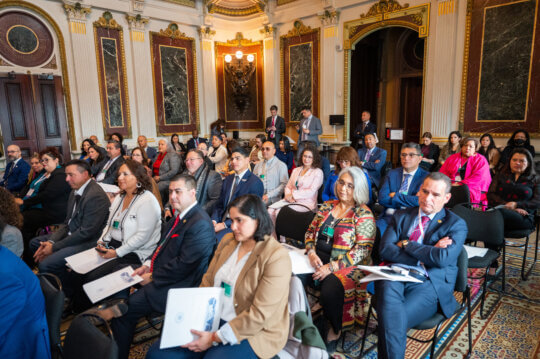
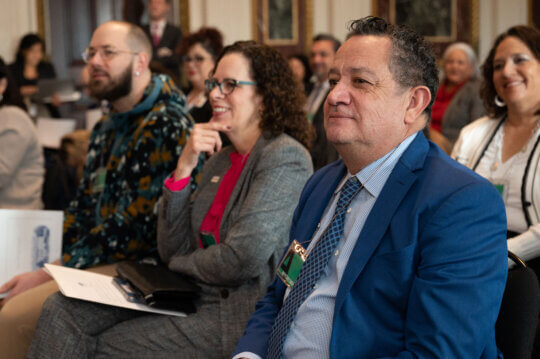
Melody Gonzalez, Executive Director, White House Initiative on Advancing Educational Equity, Excellence and Economic Opportunity for Hispanics asserted that the administration is making historic funding investments in the Hispanic educational pipeline. Under the racial equity Executive Order, they identified a broad scope of work with twelve policy areas of focus, including economic opportunity and the educational pipeline. More information on these efforts and educational equity can be found at https://www.whitehouse.gov/equity/
On student debt relief, she added, they feel confident that the debt relief program is legal, and looked carefully at the proposals with an eye to educational costs and benefits for Hispanic students and are also looking to increase access to the program through specific implementation strategies to reach Latino students.
LATINO REPRESENTATION
Claudia Chavez, Special Assistant to the President for Candidate Recruitment and Ruben Gonzalez, Special Assistant to the President for Domestic Agency Personnel both discussed the critical need for more Latino representation in government. They pointed out that there is a path for Latinos to have in government including behind-the-scenes roles that nonetheless play an important role in policy formation and execution.
UnidosUS and our Affiliate Network work with the administration—and hold the administration accountable—in our shared efforts to achieve economic, political, and social advancement for all Latinos, and we appreciated the opportunity to hear from White House leadership.
